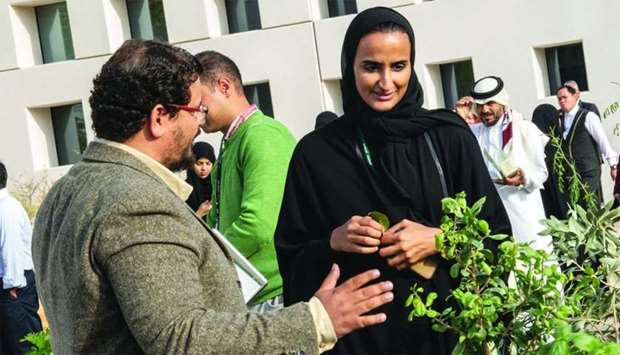Qatar Foundation has signed a memorandum of understanding (MoU) with Qatar General Electricity and Water Corporation (Kahramaa) and Siemens for establishing Education City as the test-bed for an electric car charging unit.
This will support the goal of bringing more ‘green’ cars onto Doha’s roads by 2022.
Another MoU between QF and Kahramaa will see QF support the community outreach, research, and energy data-gathering activities of the National Programme for Conservation and Energy Efficiency (Tarsheed), as well as supporting Tarsheed's Green Car Initiative through housing the electric car charging unit.
As the nation marks Qatar Environment Day 2019 today, Qatar Foundation (QF) has showcased its role as a driver, leader, and unifier of national efforts to advance sustainability – and the impact its work and partnerships in this field are making on life in Qatar.
QF’s sustainability-focused research and innovation projects, community initiatives, and achievements were spotlighted on Monday at a special Education City event, attended by HE Sheikha Hind bint Hamad al-Thani, vice chairperson and CEO, Qatar Foundation.
“Sustainability is crucial to the future of Qatar, in terms of protecting our environment, diversifying our economy, strengthening our society, and enhancing our resilience and capacity to address national challenges,” said Mohammed Abdulaziz al-Naimi, chief operations officer, QF.
“That is why sustainability is a common thread running through all the pillars of Qatar’s national development vision; and, as a key player in realising this vision, Qatar Foundation is a driver and leader of sustainability in all its forms,” he added.
“I am pleased that Qatar Foundation and Kahramaa are further unifying their efforts to enhance sustainability in Qatar, in line with the nation’s vision. Qatar is capable of advancing and achieving sustainable development for the benefit of generations to come,” noted Abdulaziz Ahmed al-Hammadi, conservation and energy efficiency manager, Kahramaa.
Throughout QF’s education ecosystem, sustainability is a core theme, with its schools cultivating understanding of its importance from a young age, and higher education programmes such as those under the Sustainable Development Division of QF member Hamad Bin Khalifa University’s (HBKU) College of Science and Engineering focusing on energy, environment, and social sustainability issues.
HBKU’s Qatar Environment and Energy Research Institute (Qeeri) has developed measures to monitor Qatar’s air quality and provide valuable information to decision-makers and the public, and launched a pilot project to supply green energy to local farms. Meanwhile, the Qeeri Solar Consortium is providing a platform for testing solar-based technology in desert conditions.
QF member Qatar Green Building Council has trained more than 4,500 people on sustainability-focused topics since 2014, with its Qatar Sustainability Awards recognising contributors to sustainable development, greener lifestyles, and environmental protection in Qatar. Among QF’s community-focused sustainability initiatives is the ‘Ghars’ campaign of its member Qur’anic Botanic Garden, enabling people to help plant 2,022 trees by the 2022 FIFA World Cup Qatar.
And through Education City’s renewable energy network, including solar photovoltaic systems and wind turbines; facilities with the world’s highest green building ratings; open recreational spaces; and environmentally-friendly workplace practices, QF is also setting a sustainable example within its own environment.

